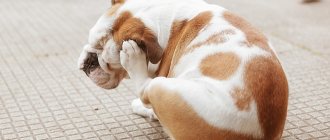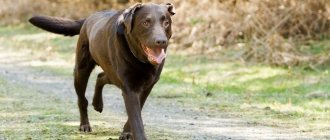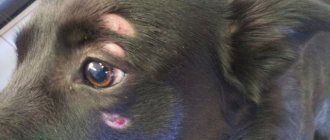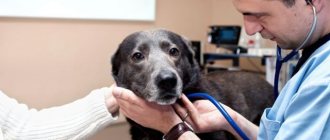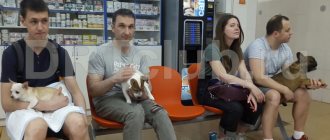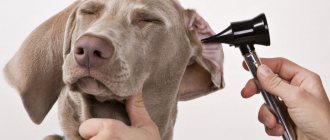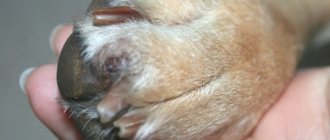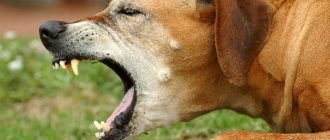As you know, dogs have an unusually strong attachment to their owners. Sometimes, during a joyful meeting, they can lick a person out of excess of feelings. There is nothing suspicious about this behavior. But it happens that the owner notices a strange habit and need in his pet: the dog often, for no apparent reason, licks or licks something. This behavior can be the result of simple, harmless reasons, or it can be a manifestation of serious health problems.
Thirst and Hunger
At the sight of food, the dog's salivary glands begin to actively produce a special secretion, which serves to lubricate and facilitate the swallowing of food. The dog begins to actively lick his lips. This is a natural reflex that is normal for the animal. However, a dog may lick its lips due to a constant feeling of hunger. You should carefully monitor the amount of feed consumed by the animal. You shouldn’t indulge your dog and feed it to its fullest, but you shouldn’t limit it too much in food. The portion of food should be appropriate for the age, weight and breed of the dog.
Care should be taken to ensure that the animal has free access to clean drinking water. Let's consider how much water a dog should drink. She should consume about 70-100 ml per 1 kg of weight per day. Naturally, on hot days, water consumption increases significantly. However, constant thirst may also indicate a disease in the animal. You should take water with you during long and active walks. Dehydration can lead to serious pathological changes in the body.
Prevention measures
All owners are recommended to check the degree of filling of their dog's paraanal glands once every 6-9 months and clean them as needed. In addition, every 2 weeks you should carefully wash the animal’s anus.
You should walk your pet daily, with moderate physical activity. It is necessary to ensure proper nutrition without overfeeding and constant access to drinking water. It is equally important to monitor the state of health and periodically administer anti-worm medications.
Damage to the mouth and pharynx
If your dog is constantly licking his lips, you should first examine his mouth for injuries and inflammation. Dogs quite often suffer from dental problems: caries, gingivitis, stomatitis. To avoid them, you should carefully watch your pet's mouth. It is necessary to periodically examine the teeth, and when the first symptoms of the disease appear, urgently take the animal to the doctor.
Problems with the oral mucosa can arise due to mechanical injuries. A sharp bone fragment can seriously damage the mouth. If a dog has something stuck in its throat, the animal begins to cough. The situation will become more complicated if the wound becomes infected. In this case, you can smell an unpleasant odor from the mouth. Due to damage to the mouth, the dog may refuse to eat and often lick its lips, behave restlessly, and rub its face with its paws. To help the animal, it must be urgently shown to a doctor.
Causes
Experts have identified 3 groups of reasons that determine the frequent urge to lick in dogs.
Natural phenomena
Physiological reactions are natural manifestations of the body that do not pose a threat to the pet’s life. These include:
A separate item includes breeds with physiological characteristics: St. Bernards, Newfoundlands. They have many folds near the mouth in which moisture accumulates. This condition is called false hypersalivation. The animal constantly licks itself, removing excess fluid.
Psychological disorders
After exposure to stress factors (fear, anxiety, impatience, loneliness), the animal begins to lick not only its nose, but also its entire muzzle. This is due to increased activity, which is why saliva is produced more often. You can often notice a slight smacking sound.
Poisoning
Nausea can cause your dog to salivate excessively. The dog begins to actively lick its lips. She may deliberately seek out grass and eat it to induce vomiting. Poisoning is often accompanied by profuse vomiting, diarrhea and high fever. If your pet picks up something on the street or eats it in the house, you can try to artificially induce vomiting to empty its stomach. To do this, you need to press the root of the animal’s tongue with two fingers. Afterwards you should give a sorbent that neutralizes toxins. If vomiting continues and the animal's condition does not improve, it should be seen immediately by a veterinarian. To avoid poisoning, you should carefully monitor your pet's diet. Food must be fresh, purchased from trusted places. Household chemicals should be hidden in a place inaccessible to the animal. When walking, you should make sure that the dog does not pick up anything from the ground.
Dehydration
This is especially true in hot weather and during active games. When a dog becomes dehydrated, the following signs may appear: dull and sticky gums, sunken eyes, and loss of skin elasticity. At the same time, the pet licks and smacks its lips all the time. It is not difficult to detect the problem: just take a fold of the animal’s skin, pull it well and release it. If it slowly returns to its original state or forms a “tent,” your dog is dehydrated. Give her something to drink immediately and take her to a cool place (if you suspect sunstroke or heatstroke). Dehydration can also occur with persistent vomiting and diarrhea. In the latter case, take your pet to the veterinarian.
Symptoms and treatment of food allergies in dogs
Increased salivation may be the result of a dog's allergic reaction. Main symptoms of food allergies:
- the dog often licks itself and swallows saliva;
- itching and hair loss;
- increased body temperature;
- redness of the mucous membranes and skin.
Poor quality food can cause allergies. To identify the allergen, you must clearly divide your dog's diet into different components in order to find the one that caused the negative reaction. The found allergen should be completely excluded from the animal’s diet. You can also switch your dog to hypoallergenic food. In the case of atypical allergies, in which the allergen cannot be found, the animal may need injections of hormonal drugs.
Reasons for the appearance of the reflex
As is known, primary reflexes manifest themselves at an unconscious level. But without reasons, which, in turn, can provoke a reaction, there are no reflexes.
Hunger and thirst
Like a person, a dog is positively receptive to various tasty odors, only the animal’s sense of smell is many times stronger and more subtle. When an animal feels hungry, the mucous membranes begin to work more intensely, saliva is produced, and the nose becomes more moist. As a reflex, the dog will often swallow saliva and lick its nose to renew the moist coating, which helps enhance the sense of smell.
It is important to note that in a pet such a reaction occurs only when a stimulus appears and when it is hungry. The constant manifestation of this reaction should not be attributed to hunger. Drying of the nose due to decreased activity of the mucous glands is another reason why a dog licks its nose. This reaction may also indicate thirst. Licking and smacking, especially in hot weather, indicates the pet's need for moisture.
Gastrointestinal problems
Some diseases of the gastrointestinal tract can lead to increased salivation:
- gastritis;
- stomach ulcer;
- neoplasms;
- inflammation of the esophagus;
- infection with bacterial and viral infections.
Often, gastrointestinal problems are also accompanied by the following symptoms:
- unpleasant odor from the mouth;
- refusal to eat;
- The dog has spasms in the throat;
- drop in activity;
- problems with stool;
- bloating;
- nausea and vomiting;
- sudden weight loss.
Problems with the gastrointestinal tract can be caused by an unbalanced diet of the animal and low-quality feed. When choosing the right food, you need to pay attention to its quality, reviews from veterinarians and other owners. When the first symptoms of the disease appear, the animal should be immediately shown to a doctor.
When is yawning natural and when is it forced?
Every person knows that the urge to yawn can be suppressed, but it is not controllable. If a yawn occurs, then it cannot be stopped, since thanks to this reflex the full functioning of the brain is carried out. Of course, the body needs all organs, so after large volumes of air enter the lungs, the heart beats faster, actively distributing oxygen throughout all systems.
Frequent yawning of a weak, exhausted animal can signal a decrease in hemoglobin, an increase in the erythrocyte sedimentation rate, or their death. A change in these indicators indicates hypoxia of the body.
In the following cases, the owner need not worry if his four-legged friend begins to yawn more often than usual:
- The dog is overtired - after running around in nature, frolicking with other dogs, or after intense work on the training ground, the pet feels the need to rest. His body is saturated with oxygen, and sleep will only benefit the animal.
- The dog is tired, but does not have the opportunity to rest - service and working dogs cannot sleep when the body needs it, because sometimes their activity requires maximum activity for a long time. Thanks to yawns, the body mobilizes strength to support the dog for subsequent activity.
In the body of an excited or extremely stressed animal (in the hypothalamus), adrenaline and other stimulating substances begin to be intensively produced. They support systems during such a difficult period, but after their breakdown toxic components are formed. And when a dog yawns, his brain activity not only accelerates, but his bloodstream is also cleared of harmful substances faster.
In the following situations, a yawn or two also has a serious meaning for the pet:
- When in an unfamiliar environment (visiting, transport, new housing, etc.), a yawn makes it clear that the dog is excited and worried.
- After a meal, the dental apparatus of dogs is designed in such a way that they cannot chew food, the dog swallows pieces of food, and when they enter the stomach, they begin to be digested. The intestinal mucosa absorbs nutritional components and then saturates the blood with them. This important process requires some time, and it is desirable that the dog is calm - the body needs additional strength. The pet’s desire to rest and sleep after eating is natural; in this case, the body will be able to extract and absorb the maximum of useful substances.
If yawning is associated with pathological processes, then it is almost impossible to identify them without additional symptoms. To detect health problems, it is necessary to evaluate the full clinical picture of the disease. That is, it is impossible to say that the dog is sick only because of frequent yawns, which are an unconditioned reflex.
When the pet’s condition still worries the owner, it is recommended to do the following:
- examine the fur, mouth, eyes, ears of your four-legged friend - pay special attention to the color of the mucous membrane;
- measure your body temperature, normally it is 37.5-38.5°C;
- offer your pet a treat - loss of appetite may be a sign of a serious illness;
- observe the dog’s behavior - if he reacts poorly to external stimuli, sleeps most of the time or lies down, constantly yawning, then you should consult a veterinarian.
With the help of long-term observation, the owner can discover a couple of reasons for the pet’s frequent yawning, which laboratory tests and various diagnostic measures are not able to identify.
Meteor dependence
The animal’s body reacts to sudden changes in atmospheric pressure and changes in weather conditions. Most often, dogs with brachycephalic syndrome are prone to this phenomenon, since by their nature they have problems with breathing, and therefore with blood pressure. In addition, in some adult Chihuahuas the fontanel does not completely close.
Pressure drops
Dogs may suffer from periodic increases or decreases in blood pressure, and sometimes comprehensive diagnostics do not reveal this. It is important for the owner to describe in more detail the condition and behavior of the pet, making sure to mention any changes that occur.
Quite vivid symptoms are accompanied by neurological disorders. Frequent yawns are associated with the functioning of the brain, that is, with the neurological sphere. The animal may experience the following phenomena:
- tremor (shaking of the body or limbs);
- cheekbone muscle tone;
- nervous tic, etc.
With such signs, it is strictly not recommended to self-treat your pet. And before visiting the veterinarian, it is important to collect a medical history with a detailed description. Unfortunately, in veterinary medicine there are not many specialists involved in the treatment of neuroses. In addition, they primarily look for physical ailments, not paying attention to the assumptions of the owners.
Without treatment, a neurotic disorder can develop into an obsessive painful state. A neurotic dog begins to yawn for any reason, as he experiences excitement at the slightest fluctuations in the emotional background, caused by both joy and less pleasant events.
You shouldn’t rule out the depression of your four-legged friend as one of the reasons for yawning. Yes, these devoted and faithful pets can suffer from this disease, which has not been fully studied, even in human medicine. If the dog is sad, anxious and behaves apathetically, you should take a closer look at his mental state.
Yawning is such a simple and familiar reflex, but upon closer examination it turns out to be a rather complex process that affects the vital systems of both humans and animals. If your pet yawns after eating, before bed and after, then this is a completely normal phenomenon. And when this occurs against the background of other signs of illness, do not neglect visiting the veterinarian.
Liver and kidney problems
The following diseases can lead to increased salivation and frequent licking:
- renal failure;
- portosystemic shunt – a violation of blood circulation in the liver area, which causes intoxication of the body;
- acute pancreatitis;
- urolithiasis – accompanied by the appearance of sand and stones in the urinary tract;
- ascites – accompanied by the accumulation of fluid in the abdominal cavity;
- amyloidosis, dysplasia, polycystic kidney disease.
Symptoms of kidney and liver problems;
- increased salivation and frequent licking;
- blood in urine;
- vomiting with bile and blood;
- weight loss;
- drop in activity;
- problems with stool.
To diagnose the exact disease, the animal must be shown to a veterinarian.
Parasites
Infection with helminths leads to serious problems with the animal’s gastrointestinal tract. As a result, the dog may begin to frequently lick its face, lick the anus, scratch certain areas of the skin, eat a lot, or refuse to eat.
Since dogs have open access to the street, where they can come into contact with contaminated objects and animals, it is necessary to periodically prevent infection with worms. To do this, the dog is given medicine according to its weight, which should remove parasites from the body. If worms still appear in the stool after the first dose, the medicine is given again until the stool becomes normal. At the same time, prevention should not be neglected, even if the animal looks absolutely healthy. Infection with helminths can lead to serious disruptions in the functioning of internal organs.
How to get rid of a bad habit
Traditional methods include treatment with conventional medications if the cause of the compulsive behavior is identified. For allergies, antihistamines are prescribed (allergostop, execan, etc.). If the reason is not clear, but it is possible to find out that the licking is caused by itching, the doctor may recommend antipruritic drugs (stop-itching, apoquel, cytoderm, etc.). These same remedies can be part of complex therapy. If licking is caused by stress, sedatives are prescribed (adaptil, cat-byut, fitex, stop-stress, etc.).
Non-pharmacological methods are often used when the cause of compulsive licking is behavioral rather than medical. These include boredom, stress, anxiety. Protective collars, blankets, socks, etc. help limit access to the “hot” spot. However, such categorical methods must be used with caution so as not to provoke even greater stress.
Natural supplements include vitamins A, D, E, and fish oil. They help reduce dry skin, improve the overall condition of the coat and skin, reduce inflammation and reduce pain. These supplements are recommended when the cause of itching is dry skin, hormonal imbalance, allergies or parasite bites. Often prescribed with medications as adjuncts.
A quick solution to the problem of compulsive licking will make your beloved pet's life much easier, and he will no longer feel uncomfortable in his own skin.
Stress
If your dog is constantly licking his lips, it may indicate stress. Over time, this habit can turn into a reflex. The following reasons can cause anxiety in an animal: moving, changing owner, going to the veterinarian. It is worth noting that small insignificant changes can also negatively affect the animal: changing the usual food to a new, new house with an unpleasant odor for the animal.
An important component for a dog's emotional health is the correct attitude of the owner towards him. Dogs are animals for which hierarchy in the pack is important. It’s just important not to overdo it when building a relationship with your pet. You shouldn’t scold your dog for no reason, hit it, or get upset over your bad mood. Don't forget to reward your pet.
How to alleviate the condition of an animal in the heat?
Firstly, you need to give a lot of water. Many people are interested in why a dog sticks out its tongue even when it always has cool water in its bowl. You just have to compare yourself and your pet. People don't stop sweating in the heat when they consume a lot of fluid, do they? That's how it is with dogs!
Secondly, for walks, choose a comfortable muzzle that will not prevent your tongue from sticking out comfortably. If a dog is unable to regulate its body temperature in this way, it may get heatstroke, its blood pressure will increase, and the animal may simply faint.
Be sure to take a bottle of water for your dog with you on your walk so that he can drink and refresh himself at any time.
Find a corner of the house protected from the sun where your pet can rest and cool down.
Epilepsy
Epilepsy attacks may be accompanied by frequent lip licking and heavy breathing. In this case, attacks can have different strengths depending on the severity of the disease. Mild seizures may be accompanied by twitching of the muzzle and nervous tics; in the worst case, the animal may convulse and lose consciousness.
Other symptoms of epilepsy:
- anxiety;
- The dog has spasms in the throat;
- increased salivation;
- attempts to hide;
- convulsions;
- involuntary urination and defecation;
- loss of consciousness.
In the event of an attack, there is no need to panic. You should monitor the time - the seizure should not last more than 5 minutes, otherwise the pet may need the help of a doctor. It is necessary to ensure that the animal is not injured. Don't try to put a spoon in your dog's mouth to prevent it from swallowing its tongue. This will not happen, and the owner’s intervention can only cause harm. After the seizure ends, the animal must be shown to a doctor to diagnose the cause of the seizure.
Thus, if your dog is constantly licking itself, you should carefully monitor the animal. This may be a completely natural reaction to the type of food or lack of water. You should carefully examine your pet's mouth for possible injuries. If the cause of increased salivation is still unclear, you should take your animal to the veterinarian.
Psychological factor
- When a dog is stressed, it reacts to repeating actions that it associates with positive emotions. Trying to calm down, the dog nervously licks its muzzle or licks its fur. The feeling of pleasure and security from this process is reinforced from a very early age, when the mother licks her puppies.
- Frequent licking can serve as a warning that the animal is experiencing discomfort, a kind of request to eliminate the irritant.
- Puppies or adult dogs with a tendency to be submissive also exhibit a similar habit of excessive licking. If the owner likes this display of affection and encourages it, then over time the pet will begin to use it excessively, attracting attention to itself.
Any strong emotions - joy, fear, excitement, impatience - cause increased salivation in the dog.
